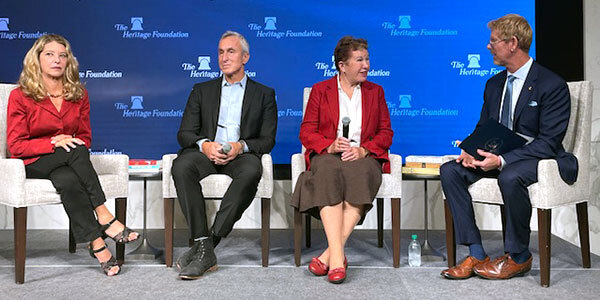Heritage panels call for DGA to promote more meat, fewer carbohydrates

Meat-RFP-092925
With the Trump administration’s rewrite of the Dietary Guidelines for Americans expected shortly, two panels at the Heritage Foundation today said Americans should be advised to eat more meat and fewer carbohydrates than in recent editions of the guidelines.
Roger Severino, vice president for domestic policy at the Heritage Foundation, a conservative think tank, noted that when he was a child he had cereal, milk and a glass of orange juice for breakfast. That meal, which replaced eggs and meat with sugary cereals such as Frosted Flakes and Froot Loops, as the basic American breakfast, was “targeted toward children very, very quickly.”
Today, he added, big-box stores have candy and soda at the checkout counter “at eye level for any kids you may have in tow.”
“Whatever you are there for, that little sugar temptation is waiting for you,” he said.
The coalition of President Trump’s Make America Great Again and Health and Human Services Secretary Robert F. Kennedy Jr.’s Make America Healthy Again movement have created “a moment” in American public health policy.
The Heritage Foundation, Severino said, is “very proud to be at the forefront of that fight” against big pharmaceutical companies, the “corrupting health agencies that failed us during COVID” and the “forces dealing with food” that are working against parents trying to raise their kids “right.”
Jay Richards, director of the Heritage Foundation’s DeVos Center for Human Flourishing, said the event — titled What’s on Your Plate: Rethinking Nutrition Guidelines — is part of Heritage’s wellness agenda.
On two panels, scientists and advocates criticized recent editions of the Dietary Guidelines for Americans and said their research has often been subject to pushback from the health and food establishment while obesity has risen in the country.
On a first panel, Nina Teicholz, author of “The Big Fat Surprise” and founder of the Nutrition Institute, said, “The embedded belief that animal fat is bad goes back to the ’50s when heart disease was on the rise from zero in the early 1900s to the No. 1 killer.” The dietary guidance to limit saturated animal fat originated with Ancel Keys, a University of Minnesota researcher who found that it caused heart disease, Teicholz said. His ideas “got implanted in the American Heart Association,” she added.
FOOD PYRAMID and MYPLATE
The Food Pyramid, the federal government’s visual representation of the Dietary Guidelines from 1992 until it was succeeded by MyPlate in 2011, replaced meats and eggs with grains and starches, Teicholz noted. The result was weight gain, diabetes and metabolic disease.
Noting that the Dietary Guidelines for Americans determine the content of food served in schools, the military and hospitals, Teicholz said Americans “need good advice from the top — get rid of it or it has to be right.” She added, “To me, the most important thing would be to lift the cap on saturated fats in the dietary guidelines.”
Gary Taubes, a journalist and co-founder of the Nutrition Science Initiative, noted that at the same time Keys was doing his work, British physicians working in the colonies found that people living in traditional societies did not have heart disease or cancer but as they transitioned to a western diet “the diseases came with them.” Sugar and flour were important to the western diet because they were the easiest to transport around the world, he said. But that research never won wide acceptance because there could only be one theory and one personality in dietary guidance, and Keys was it, Taubes added.
Taubes said, “We have to establish beyond a reasonable doubt what a healthy food is.” People were convinced to quit smoking because it was established “beyond a reasonable doubt” that smoking was unhealthy, he said.
Sally Fallon Morrell, founding president of the Weston A. Price Foundation and a cookbook author, said her work is inspired by Weston Price, a dentist who traveled throughout the world and found that the healthiest societies had nutrient-dense diets high in animal fats. Morrell calls butter “the basis for our diet” and says people should eat liver, including liver paté, once a week.
Morrell is an opponent of seeds oils, particularly soy oil. She noted that seed oils were not part of the human diet until the 1890s, when the roller press was invented. She maintains that the shortening and vegetable oil industry demonized the competition — butter and lard — and that seed oils “break down in the body” and become formaldehyde.
Morrell also says that fermented foods such as raw sauerkraut and kombucha are vital to the human diet because they provide “good bacteria in the gut.” She is also an advocate for raw milk.
ON CALORIES
On a second panel, David Ludwig, a Harvard endocrinologist and researcher, said that all calories are not the same, that “a century of research” shows that the type of foods people eat produces differences in the body.
“The type of calories you eat can affect the number of calories you burn,” Ludwig said.
Benjamin Bikman, a professor at Brigham Young University, discussed the relationships among glucose, fructose and insulin in scientific detail. The single most important health problem in the world is insulin resistance, Bikman said. Bikman added that the dietetics department tried to get him fired when he was up for tenure.
“If it comes in a bag or box with a barcode, it should be avoided,” Bikman said.
Richard Johnson, a professor at the University of Colorado, was particularly critical of high-fructose corn syrup (HFCS).
The second panel advised against demonizing one type of food. “Not all carbs are going to be public enemy No. 1,” Ludwig said. Some cultures have eaten carbs without problems, but they tend to be physically active, which gives the body the ability to regulate itself, but most Americans are sedentary and stressed, he said.
“I don’t think that saturated fat gets a full pass,” Ludwig added. He noted that death from heart disease is half what it was in the 1950s, but that is partly due to the development of drugs.
Earl Butz, the agriculture secretary in the Eisenhower administration who famously told farmers to plant “fencerow to fencerow,” was worried about whether there would be enough food, and the food industry responded when “our profession asked them to reduce fat and increase carbs,” Ludwig said.
Ludwig has recently criticized the use of the Nova system for describing ultraprocessed food.
Rushing to adopt the Nova system into public policy could be bad policy, he said.
Johnson, Ludwig and Bikman also said that GLP-1 drugs should be prescribed along with dietary advice.
Morell said that she is “heartened” that butter from pasture-raised cattle and kombucha are available in her local Food Lion and that liver is the cheapest meat available.
After the event, the Heritage Foundation offered a series of box lunches that were in line with the ideas presented: a steak and summer squash bowl, a paleo bowl with salmon, a whole 30 bowl with chicken, or a low-FODMAP bowl, along with chocolate cookies and macaroons for dessert.







